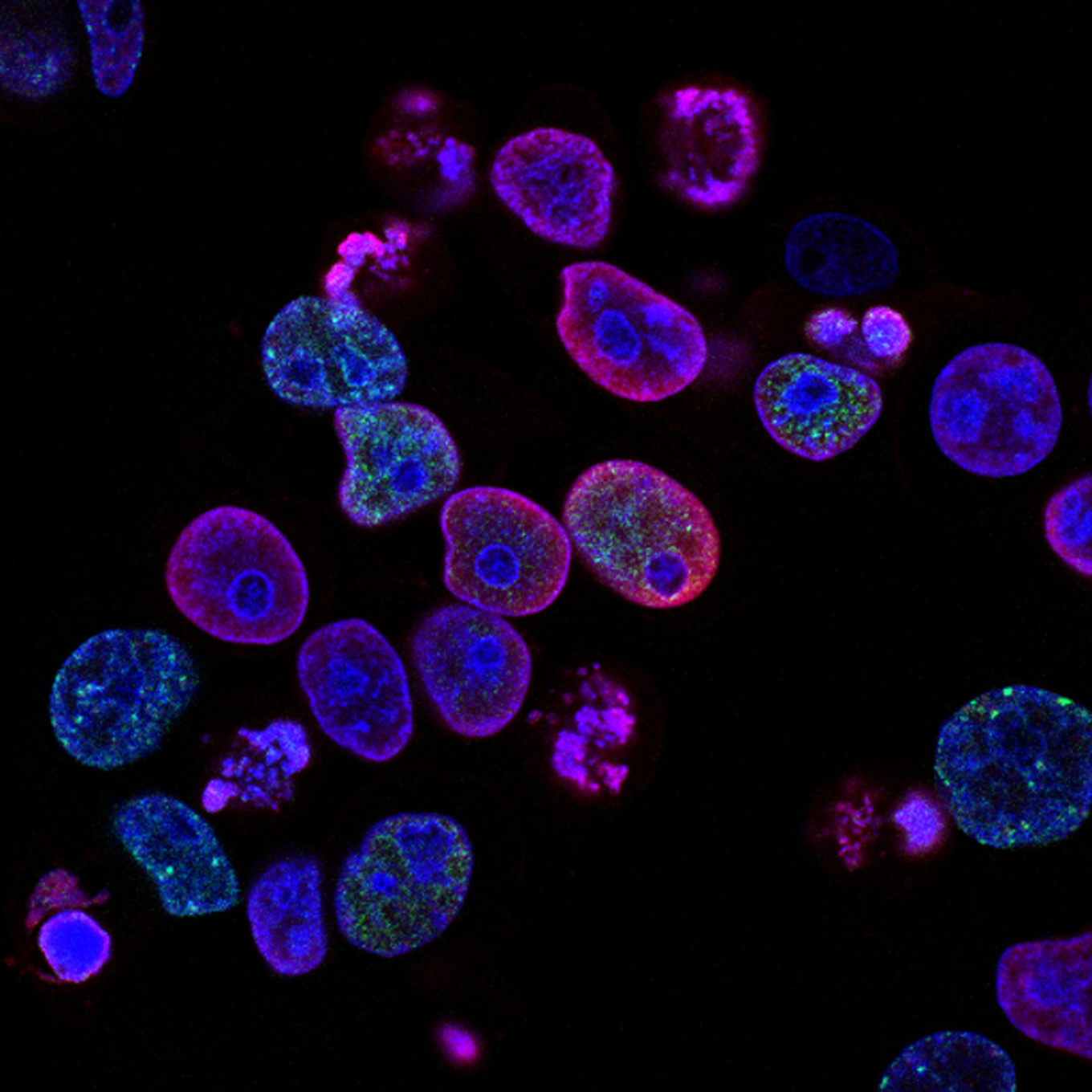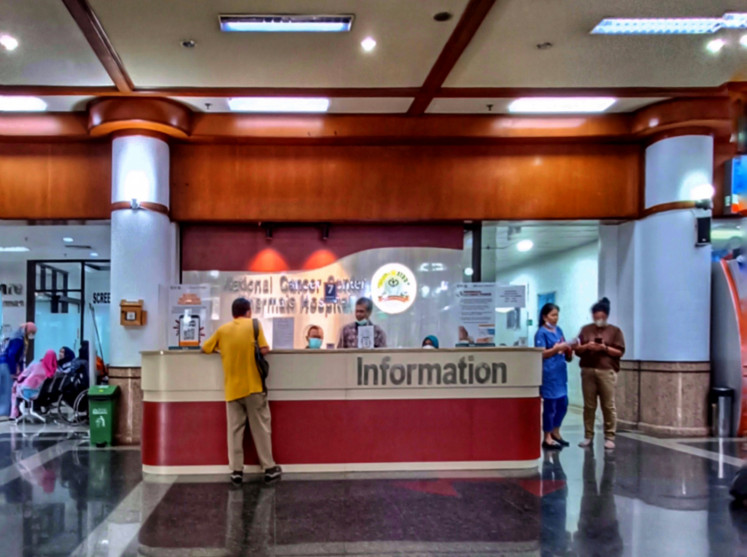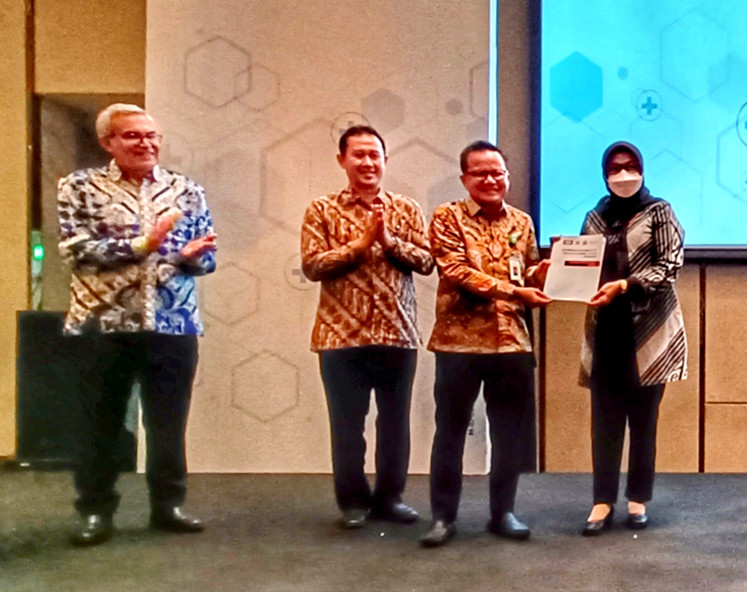Popular Reads
Top Results
Can't find what you're looking for?
View all search resultsPopular Reads
Top Results
Can't find what you're looking for?
View all search resultsNew initiatives seek to improve cancer detection and treatment in Indonesia
A public-private partnership has resulted in three new programs to improve the diagnosis and treatment of cancer in the country.
Change text size
Gift Premium Articles
to Anyone
 New programs: Aiming to improve cancer diagnosis and treatment, the Dharmais national cancer center is participating in three new programs in collaboration with the University of New Mexico in the United States, Tata Memorial Centre in India and the University of Indonesia. (Unsplash/National Cancer Institute) (Unsplash/National Cancer Institute)
New programs: Aiming to improve cancer diagnosis and treatment, the Dharmais national cancer center is participating in three new programs in collaboration with the University of New Mexico in the United States, Tata Memorial Centre in India and the University of Indonesia. (Unsplash/National Cancer Institute) (Unsplash/National Cancer Institute)
A
public-private partnership has resulted in three new initiatives to improve the diagnosis and treatment of cancer in the country.
Many different dialects are overheard in the waiting room of Dharmais Cancer Hospital in West Jakarta. This is not really surprising, as the government-owned hospital is the national center for cancer diagnosis and treatment and the main referral institution for cancer patients in the country.
Among the patients in the hospital’s waiting room that afternoon was Ika, who was persuading her father in a thick Moluccan accent to change his sweater, which had been soiled after he threw up in the bathroom. But the old man just grunted.
“[My father] is tired and in a lot of pain,” Ika said during an interview at the hospital on Dec. 23. “We just arrived in Jakarta yesterday. And this morning, we went straight here for a doctor's consultation.”
Ika’s father, a 56-year-old retired schoolteacher from Tual, Maluku, was recently diagnosed with stage three bone cancer after years of persistent pain.
“We had consulted many doctors in our hometown, but they merely dismissed [the symptoms] as rheumatism,” the 22-year-old said.
When the pain got worse and a lump appeared on his arm, the family brought him to a specialist in Ambon, where he got the diagnosis.
“His prognosis is not good,” Ika said. “The oncologist suggested that we bring him to Jakarta for better treatment.”
Ika’s father was not the only patient coming to the hospital at a late stage.
“Most patients come to Dharmais at the third or fourth stage, which result in bad prognosis and more complicated treatments,” Soeko Werdi Nindito D., director of Dharmais Cancer Hospital, said during a press conference at The Westin, Jakarta, on Nov. 2.
In fact, most cancer patients in Indonesia are diagnosed at an advanced stage.
“Seventy percent of [Indonesian] cancer patients come [for treatment] at a late stage,” Aswan Usman, director of health service facilities at the Health Ministry, said.
The late diagnosis is mainly caused by a lack of cancer specialists, especially in remote areas of Indonesia.
According to Health Ministry data, there are only 139 hematologists-oncologists in 17 provinces in the archipelago. And these specialists mainly work in hospitals in the cities.
It is a disheartening fact, as cancer is currently the non-communicable disease that causes the third-highest number of deaths in the country, after stroke and hypertension.
According to the data from the global cancer database Globocan, there were 234,511 deaths in the country caused by cancer in 2020.
Cancer prevalence in the country has also increased at a steep 28 percent rate from 1.4 per 1,000 people in 2013 to 1.8 per 1,000 people in 2018, according to the Basic Health Survey (Riskesdas).
“Therefore, the Health Ministry has programmed a thorough health system transformation for cancer and other illnesses that are the major causes of deaths in the country,” Aswan said.
To improve cancer diagnosis and treatments, Dharmais, as the national center for cancer, has participated in three new programs, which are the Extension for Community Healthcare Outcomes (ECHO), an oncology nurse capacity building program and the Cancer Patient Navigation (NAPAK), in collaboration with the University of New Mexico in the United States, Tata Memorial Centre in India and the University of Indonesia (UI). The collaboration is being facilitated by Roche Indonesia.
Project ECHO
“These three projects are very important because they respond to specific needs,” Ait-Allah Mejri, president director of Roche Indonesia, said in the press conference. “Today, 70 percent of cancer patients in Indonesia come [for treatment] at an advanced stage. [The cancer has already] metastasized. That means all the treatments are not to cure these patients, but are palliative.”
“With the ECHO project, we keep patients within their communities,” Mejri added. “The specialists will travel to them via technology.”
Project ECHO, which was created by Indian American physician Sanjeev Arora in 2003, uses a hub-and-spoke model to share knowledge and expertise between experts in big cities and doctors in remote areas.
“As you know, in your country with [over] 17,000 islands, building healthcare infrastructure is a daunting challenge,” Arora said on video. “ECHO was created to address this challenge by enabling healthcare workers and remote communities to provide the best possible care for their patients.”
In the first stage of the program in Indonesia, Dharmais hospital in Jakarta and Sardjito hospital in Yogyakarta have been established as the hubs. As hubs, experts in these hospitals will host teleconferencing sessions with doctors in remote areas, in which they will discuss ongoing cases.
“So, these teams of specialists will speak to these doctors, see results of the biopsies and then decide on the best treatment,” Mejri said. “So it’s as if you have the team of specialists in that remote province.”
Dharmais hospital is now focusing on three main areas in its initial ECHO project, which are breast cancer treatment, pediatric cancer treatment and early detection of breast cancer. Meanwhile, Sardjito hospital will be focusing on early detection of breast cancer for now.
According to Globocan data in 2020, the number of new cases of breast cancer is currently the highest (approximately 16.6 percent) among all the cancers in Indonesia.
By the end of 2024, The ECHO project coordinators hope to have at least 10 hubs and 100 spokes in the country.
Project ECHO: Pictured is the information desk at Dharmais Hospital in Jakarta. Dharmais focuses on breast cancer treatment, pediatric cancer treatment and early detection of breast cancer in the Extension for Community Healthcare Outcomes (ECHO) project. (JP/Sylviana Hamdani) (JP/Sylviana Hamdani)Oncology nurse training
Nurses are doctors’ most important partners in ensuring the best treatment for patients. But unfortunately, Indonesia is also lacking in practitioners of this profession.
“The nurse ratio in Indonesia is still very low, about 2.4 per 1,000 inhabitants,” Aswan said.
And Indonesia has no certified oncology nurses.
“The University of Indonesia has just opened a study program for oncology nurses, and no one has graduated [from the program] yet,” said Nani Widjaja, partnership project coordinator of Roche Indonesia, during the press conference.
It takes three years of study for a nurse to become a certified oncology nurse.
Cancer as a disease has a long trajectory, starting from screening and early detection and continuing to diagnosis and therapies. Nurses who care for cancer patients need specific competencies for each stage of the trajectory.
“The oncology specialist nurse study program at UI is the first and currently still the only one in Indonesia,” said Agus Setiawan, dean of the Nursing Faculty of UI.
Dharmais, in collaboration with the Indonesian Association of Oncology Nurses (HIMPONI) and Roche Indonesia, has recently sent 31 of their nurses to study at the faculty on scholarships. HIMPONI is also conducting short-term basic oncology training for nurses.
“The training is based on a nationally accredited curriculum, which has been reviewed and supported by the International Society of Nurses in Cancer Care [ISNCC], which is equivalent to the curriculum in the United Kingdom, Australia and Hong Kong,” said Kemala Rita Wahidi, chair of HIMPONI. “We believe that this short-term training will be able to respond to the pressing need for oncology nurses in Indonesia.”
Since November, Sardjito Hospital has also been operating a basic training center for oncology nurses in Yogyakarta and its surroundings.
Indonesia hopes to have at least one certified oncology nurse in every province by the end of 2024.
Joining forces: Roche Indonesia president director Ait-Allah Mejri (left), Dharmais Cancer Hospital director Soeko Werdi Nindito D. (second left), Health Ministry director of health service facilities Aswan Usman (second right) and Sardjito Hospital managing director Eniarti (right) launch collaborative projects at The Westin, Jakarta, on Nov. 2. (JP/Sylviana Hamdani) (JP/Sylviana Hamdani)NAPAK
Kartika was diagnosed with stage-two breast cancer when she was just 26 years old.
“She was devastated and initially refused any treatments as she felt there was no point,” said Dian, Kartika’s elder sister, in a phone interview on Dec. 22. “After we assured her [that cancer could be treated], she agreed to go to chemotherapy.”
But Kartika lived in Jakarta by herself. Dian and her mom, who lived in another city, could not always keep an eye on her.
“When Kartika returned home to Bandung a year later, she was in pretty bad shape,” Dian said. “She confessed that she only went to two of her chemotherapy sessions. And by that time, her cancer has metastasized to her lungs.”
The young woman passed away a few days after celebrating her 28th birthday.
“Patients are always [feeling] alone,” Ait-Allah said. “When they receive the diagnosis, they go home, they’re alone. They go to treatments, and when they return home, they’re alone. There are no follow-ups, counseling or any psychological support.”
The NAPAK program aims to provide patients with someone who will help them navigate the often complicated paperwork at the hospital, give them emotional support, monitor their progress and ensure that they adhere to their therapies.
Eight hospitals in Indonesia, including Dharmais, have now sent 25 of their representatives to study the cancer patient navigation program at Tata Memorial Centre in Mumbai, India, on scholarships for a year.
“India has quite a similar [healthcare] situation as Indonesia,” Soeko of Dharmais Hospital said. “Therefore, we believe that the program can be successfully emulated in Indonesia.”
“It’s indeed a pleasure to introduce our patient navigation program to Indonesia,” said Dr. Rajendra Badwe, director of Tata Memorial Centre.
“[In the program] the cancer patient navigator will be equipped with a thorough knowledge of the disease, choices of therapies and treatment costs, so that when they talk to the patients, they will be able to represent the doctors, and when they talk to the doctors, they can represent the patients,” Badwe explained.
After graduating from the program, Indonesian NAPAK practitioners are expected to train more doctors, nurses and social workers that are interested in taking part of the program.
By the end of 2024, Indonesia hopes to have 25 NAPAK trainers, 50 NAPAK practitioners, eight NAPAK units embedded in local hospitals, as well as one NAPAK training center in the country with an accredited national curriculum.
The program also aims to help 1,000 cancer patients in Indonesia each day by 2024.
“We’re taking small steps,” Soeko said. “But hopefully, what we’re doing now will become a new milestone for the acceleration of the Indonesian healthcare transformation, especially for cancer patients in the country.”












